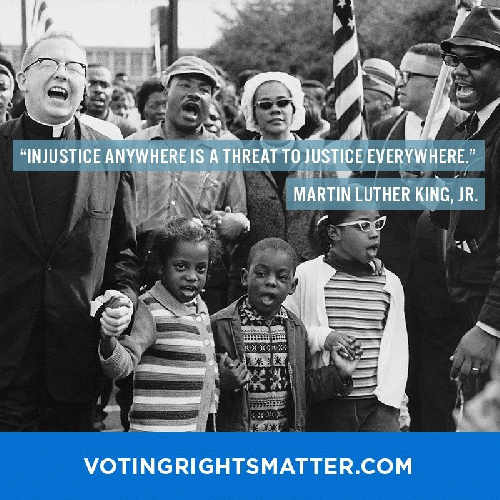
Voting rights
(Image by (From Wikimedia) The Democratic Party of Georgia, Author: The Democratic Party of Georgia) Details Source DMCA
2018 mid-term elections ushered in a wave of progressive candidates and state ballot measures.
One of the most consequential outcomes occurred in the state of Florida, where Amendment 4 restored voting rights to 1.5 million ex-felons, except those convicted of murder or a felony sexual offense, "after they complete all terms of their sentence including parole or probation."
However, if we think Republicans are going to just going roll over and accept enfranchising more voters after decades of tactics designed to suppress the minority vote, we are grossly underestimating them.
Last week, the Republican-controlled Florida state senate voted along party lines on reform bill SB 7066 which would prohibit felons with restitution, fees, and fines from voting should the new Republican governor, Ron DeSantis, sign it.
This is yet another Jim Crow era-like tactic, akin to Reconstruction poll taxes, the GOP is hoping will siphon off possible Democratic votes.
Republicans know their policies are unpopular to most Americans, so in order to win, they cheat.
However, this time Republicans might also be harming their own since the majority ofFlorida's ex-felons are white.
Michael Morse, a PhD candidate at Harvard University working on a dissertation on Amendment 4, said:
"A lot of the people impacted are white and they're certainly not all Democrats."
He cites the Florida Rights Restoration Coalition, a grassroots group that rallied voters in favor of Amendment 4, whose political director is a white Republican.
Since many who gained voting rights in November have already registered, the passage of the recent suppression bill would require the state government to abrogate those registrations.
According to the bill, those who registered between Jan. 8 when the amendment went into effect and July 1 cannot be prosecuted for voter fraud if their outstanding fines or fees later determine them ineligible to vote.
Although Florida's criminal debt structure makes this case somewhat unique, supporting the state's action is a precedent set in Arizona requiring citizens to defray all court costs before regaining their voting rights, which the Supreme Court upheld.
Nothing in the ballot initiative's language mentioned anything about criminal debt.
Micah Kubic, executive director of the Florida American Civil Liberties Union (ACLU), said:
(Note: You can view every article as one long page if you sign up as an Advocate Member, or higher).





